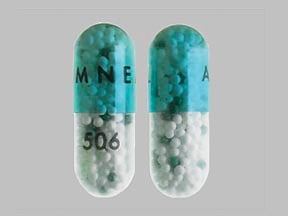
Indomethacin ER Coupons & Savings Card – Discount Prices from $15.98
Indomethacin, a nonsteroidal anti-inflammatory drug (NSAID), is designed to alleviate pain, swelling, and joint stiffness associated with various forms of arthritis, bursitis, tendonitis, and shoulder pain. It is particularly effective for moderate-to-severe cases of rheumatoid arthritis, ankylosing spondylitis, osteoarthritis, and gouty arthritis, although the extended-release version is not used for gout attacks. Indomethacin works by inhibiting cyclooxygenase (COX) proteins, which are responsible for causing inflammation and pain.
Available in both immediate-release and extended-release capsule forms, as well as a liquid, Indomethacin is typically prescribed for individuals aged 15 and older, with immediate-release dosages taken 2 to 4 times a day and extended-release capsules taken once daily. While it is beneficial for managing chronic conditions, it does not provide immediate relief for acute pain, such as sudden gout attacks. Common side effects include headache, dizziness, and stomach upset. Always consult a healthcare professional before using this medication, and consider discussing non-drug treatments for chronic conditions like arthritis.
Our coupons are free to use. Before paying, show the pharmacist your Indomethacin ER savings card to get your free discount. Use our filters below to edit the prescription box to match your needs. The Indomethacin ER prices will update based on your prescription needs. Above our Indomethacin ER coupons, you can change your location to see pharmacy prices and costs in other areas. We're here to help you buy Indomethacin ER at the lowest price with our prescription discount card.
My prescription
Edit
75MG, Indomethacin ER (60 Capsule Extended Releases)
Select pharmacy

CVS
$21.80
COUPON PRICE
Walmart
$15.98
COUPON PRICE
Walgreens
$20.46
COUPON PRICE
Albertsons
$27.54
COUPON PRICEIndomethacin ER savings card
Show this card to your pharmacist
Walmart
$15.98
BIN
ID
PCN
GRP
019876
LHE5645B83
CHIPPO
LHX
Powered by
Indomethacin, a nonsteroidal anti-inflammatory drug (NSAID), is designed to alleviate pain, swelling, and joint stiffness associated with various forms of arthritis, bursitis, tendonitis, and shoulder pain. It is particularly effective for moderate-to-severe cases of rheumatoid arthritis, ankylosing spondylitis, osteoarthritis, and gouty arthritis, although the extended-release version is not used for gout attacks. Indomethacin works by inhibiting cyclooxygenase (COX) proteins, which are responsible for causing inflammation and pain.
Available in both immediate-release and extended-release capsule forms, as well as a liquid, Indomethacin is typically prescribed for individuals aged 15 and older, with immediate-release dosages taken 2 to 4 times a day and extended-release capsules taken once daily. While it is beneficial for managing chronic conditions, it does not provide immediate relief for acute pain, such as sudden gout attacks. Common side effects include headache, dizziness, and stomach upset. Always consult a healthcare professional before using this medication, and consider discussing non-drug treatments for chronic conditions like arthritis.
Our coupons are free to use. Before paying, show the pharmacist your Indomethacin ER savings card to get your free discount. Use our filters below to edit the prescription box to match your needs. The Indomethacin ER prices will update based on your prescription needs. Above our Indomethacin ER coupons, you can change your location to see pharmacy prices and costs in other areas. We're here to help you buy Indomethacin ER at the lowest price with our prescription discount card.
More prescriptions for rheumatoid arthritis
More prescriptions for rheumatoid arthritis
Plaquenil Save 71%coupons from $13.87
Cortisone Save 28%coupons from $448.11
Indocin Save 90%coupons from $467.32
Olumiant Save 17%coupons from $5554.87
Prednisolone Sodium Phosphate Save 75%coupons from $3.78
Naprelan Save 83%coupons from $149.25
Cimzia Save 14%coupons from $6508.48
Zipsor Save 89%coupons from $116.20
Indomethacin ER dosage forms
Use our Indomethacin ER 75MG coupon with prices from $15.98 for 60 Capsule Extended Releases. You can also use our Indomethacin ER 75MG coupon with prices from $2.72 for 1 Capsule Extended Release. We have a Indomethacin ER 75MG coupon with prices from $4.07 for 7 Capsule Extended Releases. You can use our Indomethacin ER 75MG coupon with prices from $4.75 for 10 Capsule Extended Releases.
Dosage Quantity Price from Per unit 75MG 60 Capsule Extended Releases $15.98 $0.27 75MG 1 Capsule Extended Release $2.72 $2.72 75MG 7 Capsule Extended Releases $4.07 $0.58 75MG 10 Capsule Extended Releases $4.75 $0.47 75MG 14 Capsule Extended Releases $5.65 $0.40 75MG 15 Capsule Extended Releases $5.87 $0.39 75MG 20 Capsule Extended Releases $6.99 $0.35 75MG 21 Capsule Extended Releases $7.22 $0.34 75MG 30 Capsule Extended Releases $9.24 $0.31 75MG 50 Capsule Extended Releases $13.73 $0.28
| Dosage | Quantity | Price from | Per unit |
|---|---|---|---|
| 75MG | 60 Capsule Extended Releases | $15.98 | $0.27 |
| 75MG | 1 Capsule Extended Release | $2.72 | $2.72 |
| 75MG | 7 Capsule Extended Releases | $4.07 | $0.58 |
| 75MG | 10 Capsule Extended Releases | $4.75 | $0.47 |
| 75MG | 14 Capsule Extended Releases | $5.65 | $0.40 |
| 75MG | 15 Capsule Extended Releases | $5.87 | $0.39 |
| 75MG | 20 Capsule Extended Releases | $6.99 | $0.35 |
| 75MG | 21 Capsule Extended Releases | $7.22 | $0.34 |
| 75MG | 30 Capsule Extended Releases | $9.24 | $0.31 |
| 75MG | 50 Capsule Extended Releases | $13.73 | $0.28 |
| 75MG | 90 Capsule Extended Releases | $29.22 | $0.33 |
| 75MG | 100 Capsule Extended Releases | $31.47 | $0.32 |
| 75MG | 500 Capsule Extended Releases | $55.50 | $0.11 |
